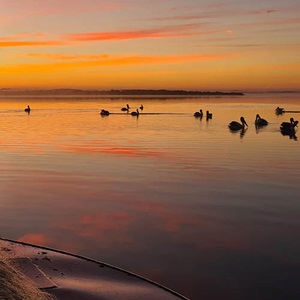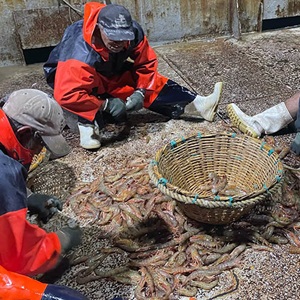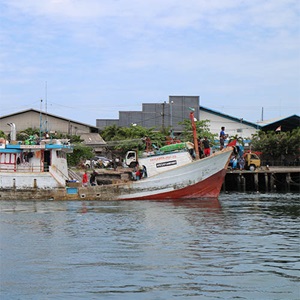New projects to address fishery impacts to endangered and protected species, marine habitats and ecosystems using three different advanced technological approaches.
- Recycling end-of-life fishing nets, using advanced manufacturing technologies
- Testing electronic monitoring devices that will be used to ensure compliance around use of bird scaring lines
- Employing AI to automate data collection for better bycatch management
Start date: April 2025
£24,999
Science and Research Fund
Awardee
South African Deep-Sea Trawling Industry Association
Fishery
South Africa hake trawl
Moving into a new sustainable future
The South African hake trawl fishery has been certified as sustainable to the MSC Fisheries Standard since 2004. It has undergone three reassessments, consistently improving to meet best-practice levels. With recertification to the updated MSC Fisheries Standard (v3.1) ahead of it, the fishery is proactively addressing upcoming eligibility requirements.
To support the transition, the fishery has received a Science and Research Fund grant from the MSC Ocean Stewardship Fund. This will support three projects, including a key collaboration with OCEAN Action Network. Additional partnerships with Imvelo Blue Consultancy and the University of Cape Town will help trial advanced technologies.
These initiatives aim to enhance environmental performance, improve monitoring and ensure regulatory compliance. If successful, they may also be adapted by other regional fisheries, expanding their impact.
Recycling end-of-life trawl nets to prevent ghost fishing gear
MSC Fisheries Standard v3.1 requires fisheries to implement strategies for managing the impacts of lost or abandoned fishing gear—commonly known as "ghost gear." Ghost gear poses a major threat to marine ecosystems by entangling wildlife, damaging sensitive habitats like coral reefs, and contributing to plastic pollution. Providing disposal facilities for end-of-life gear is recognised as an effective mitigation measure.
To support its ghost gear strategy, the fishery will work with OCEAN Action Network and project partner Ocean Plastic Technologies, to recycle used nets using self-contained micro-recycling pods. These pods will be installed at a major fish landing wharf to ensure easy access. Collected nets will be sorted and processed into high-value, densified materials suitable for reuse in plastic manufacturing.
This initiative not only minimises environmental harm from discarded gear but also promotes circular economy practices and sustainable waste management. By offering a no-cost alternative to landfill disposal, the project incentivises better gear retrieval and disposal practices, reducing the fishery’s overall environmental footprint.
Verifying bird scaring line deployment compliance
The second project focuses on verifying compliance with bird scaring line (BSL) deployment guidance. BSLs are highly effective in deterring seabirds from getting entangled in fishing gear, but monitoring has been difficult due to the limited presence of onboard scientific observers.
To bridge this gap, Imvelo Blue consultancy will equip ten hake trawl vessels with electronic tension monitoring devices on their BSLs. These devices will track and transmit real-time tension data to onboard monitors and a cloud-based system. This will enable onshore observers to confirm whether BSLs are properly deployed during fishing operations. This independent verification will be critical for the fishery in meeting future MSC v3.1 requirements.
Contributing to the development of AI tools to monitor bycatch
The third project is a collaboration with the University of Cape Town to develop Artificial Intelligence-powered software for onboard video cameras. This system will help assess interactions with non-target or endangered, threatened, and protected (ETP) species.
The AI software will analyse video footage of the discarded catch as it moves along conveyor belts, identifying and quantifying both target and incidental catch discards in real time. Trained using images from commercial fishing operations, the AI will streamline species identification, boost data accuracy, and significantly reduce manual labour in the monitoring process.
“This OSF grant is a great opportunity to bolster our work and is of huge conservation value. These pilot projects have the potential to benefit several fisheries when widely implemented by encouraging the use of technologies to minimize impacts on endangered, threatened, or protected species, reduce the gear loss/ghost gear impacts, and mitigate the impacts on marine ecosystems.”
South African Deep-Sea Trawling Industry Association (SADSTIA).
Related projects

Australia Lakes & Coorong: Improving harvest strategies

Mexican North Pacific brown shrimp: Systematic improvement

